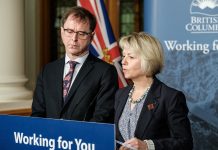AS the May long weekend approaches, the government reminds people to avoid all non-essential travel in the province to prevent the spread of COVID-19 and instead stay local if you do decide to enjoy the outdoors.
Though some restrictions are expected to ease next week, it remains vital for everyone to maintain physical distancing and take other important measures to limit the spread of COVID-19. This includes staying home if you have any symptoms of illness, washing your hands frequently with soap and water, and not touching your face.
Here are some tips to help you enjoy the long weekend while following the public safety guidelines set by the provincial health officer (PHO):
Have fun close to home
Now is not the time to travel for tourism or recreation. By continuing to avoid non-essential travel, British Columbians can do their part to protect vulnerable people in communities from COVID-19. Things to keep in mind over this long weekend include:
* Do not visit vacation properties:
Now is not the time to camp, or to travel to secondary homes or vacation properties in other communities. Access to resources and health care may be more challenging in smaller communities if someone should become ill or if there’s a community outbreak. By staying home and maintaining physical distancing, British Columbians can take pressure off the already strained resources in these smaller areas.
* Do not go pleasure boating right now
Recreational mariners are reminded to avoid non-essential trips on the water and stay close to home. Each call search-and-rescue specialists respond to puts them at risk of exposure to COVID-19, as well as requiring them to use precious supplies of personal protective equipment. As well, boaters should be aware that some small coastal First Nations communities have closed their villages to visitors to protect themselves from COVID-19, so boaters may not have access to fuel, supplies and other services.
* BC Ferries service is reduced on many routes
BC Ferries is reminding people that ferries are available for essential travel only this long weekend. If you are required to travel right now, remember that BC Ferries service has been reduced on many routes, and COVID-19 screening is a Transport Canada requirement for sailings over 30 minutes in duration. Before you travel, check sailing schedules. Reservations are strongly recommended. To support physical distancing, people can remain in their vehicles on both upper and enclosed lower decks.
* Only visit your local provincial park or recreation site
As of May 14, all provincial campgrounds remain closed and most provincial parks, recreation sites and trails are open for day-use only. Access to beaches, trails, most picnic areas and washroom facilities, and boat launches is permitted. However, in keeping with public health guidelines around non-essential travel, people are urged to only visit parks and recreation sites close to their home and avoid travelling to small communities.
Some parks will remain closed due to potential challenges with high numbers of anticipated visitors. If you get to your favorite park and find it busy, come back another time.
* Check out your local farmers market
Supporting local producers and food suppliers, choosing to Buy BC is as important as ever. Under the public health officer’s orders and guidelines, farmers markets can and are continuing to operate in B.C. at this time. The BC Association of Farmers’ Markets is also helping to provide customers with locally grown and prepared food products through a new online platform. More than 40 farmers markets are connected virtually to serve their communities.
* Enjoy the outdoors safely
Placing extra attention on staying safe in the outdoors will support the health and safety of everyone, including first responders such as BC Wildfire staff, search-and-rescue volunteers, paramedics and other emergency staff.
* Small campfires are allowed but other burning prohibitions remain in place
Responding to unnecessary, human-caused wildfires could increase the risk of BC Wildfire Service staff being exposed to COVID-19 and potentially affect their response capability at the height of the wildfire season.
Campfires are currently allowed within the BC Wildfire Service’s jurisdiction but they must not be larger than 0.5 metres in height or width. People who plan to light a campfire as they enjoy day-use activities at provincial parks and recreation sites must remember to fully extinguish it and ensure the ashes are cold to the touch before leaving the area.
Prohibitions remain in place for Category 2 open fires, Category 3 open fires, Resource Management Open Fires and other activities (e.g., use of fireworks, sky lanterns, burning barrels and burning cages). In collaboration with provincial public health partners, the Province has extended its own open burning restrictions for all High Smoke Sensitivity Zones in the province until June 15, 2020.
* Plan ahead and stick to well-marked trails
During the pandemic, there is also higher risk for B.C.’s 2,500 search-and-rescue volunteers as there is a risk of virus transmission during a call to help those who are lost, stranded or injured in B.C.’s outdoors. British Columbians are asked to do their part: do not venture into the wilderness at this time. If you must go outdoors, plan a day trip, stick close to home on well-marked trails, and make sure to pack the right provisions and clothing for the weather.
* Conservation officers will be monitoring activity
Throughout the long weekend, conservation officers will continue patrols to ensure public safety and protect B.C.’s environment, fish and wildlife resources. Help them stay safe and do their work by sticking to the rules and report suspected violations to the 24/7 poachers and polluters hotline at 1 877 952-7277.













